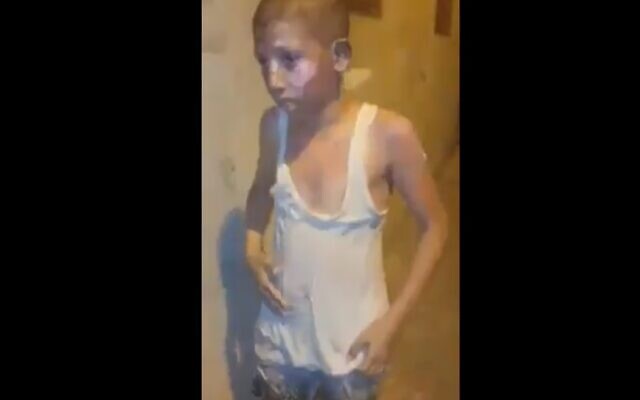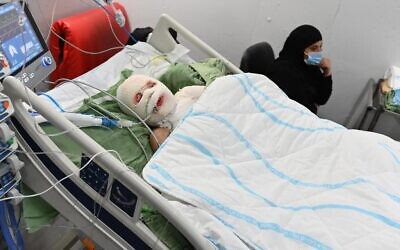Further improvement in condition of boy badly hurt in Jaffa firebombing attack
Sheba Medical Center on Saturday reported an improvement in the condition of a 12-year-old Arab boy from Jaffa who was seriously wounded in a firebombing attack on the night of May 14.
The hospital said Muhammad Gintazi was in good condition, fully conscious and communicating with those around him.
The announcement came hours after police said a second suspect had been arrested over the firebombing, which came amid ethnic violence in mixed Jewish-Arab cities and other locations across Israel.
This past Sunday Gintazi’s doctor had told The Times of Israel that he “will almost certainly recover nicely.”
Amid Arab-Jewish rioting that spread throughout the country as Israel underwent an armed conflict with Gaza, attackers firebombed the Arab home in the Ajami neighborhood of the coastal city last Friday night, seriously injuring 12-year-old Muhammad and lightly wounding his 10-year-old sister.
Get The Times of Israel’s Daily Edition by email and never miss our top stories
Free Sign Up

Firebomb victim Muhammad pictured shortly after his home in Jaffa was attacked. (Screenshot/Twitter)
Police suspect the home was attacked by Arab rioters who mistakenly believed the home belonged to a Jewish family.
Muhammad arrived at Sheba Medical Center with 12 percent of his body covered by burns and suffering from smoke inhalation, and he had to be mechanically ventilated and sedated.
“He will recover fully. He will need rehab and plastic surgery but the impact should be benign,” Dr. Itai Pessach, head of the hospital’s children’s section, said Sunday.
Pessach added that early actions by Muhammad’s mother, Nura, made all the difference.

Muhammad, 12, who was injured by a firebomb on Friday at his home in Jaffa, pictured in his bed at Sheba Medical Center (courtesy of Sheba Medical Center)
“She took him to the bathroom immediately and washed him, removing the flammable liquid,” Pessach said. “We think this was very important in preventing the burns from becoming more severe.”
Nura’s calm reaction in the crisis also helped smooth his arrival to the hospital.
“He came with his mother and brother who were not hysterical but were worried, as you would expect if a Molotov cocktail were thrown into your living room during an evening,” Pessach said.
Muhammad was conscious and in stable condition when he arrived at Sheba, where he was given a special biological treatment for burn victims.
“He was burnt on his upper torso and face. He was scared. He was in pain, and we treated him for the pain very rapidly,” Pessach said. “We had to mechanically ventilate and sedate him for the treatment he got and in order to stop him being so scared. That’s part of the standard treatment for any child with burns. We use a very advanced biological treatment for the burns that really improves outcome if given early.”
Pessach said that the boys’ parents are “angry,” but would not be drawn into casting blame.
“They are not blaming the country or a certain group in the country,” Pessach said. “They are just frustrated by the situation and the fact children become part of the conflict.”
Nathan Jeffay contributed to this report.
